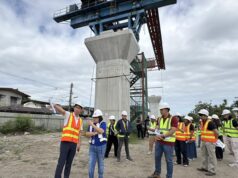Finance Secretary Carlos G. Dominguez III and Trade and Industry Secretary Ramon M. Lopez signed on Monday, 21 June 2021, the Implementing Rules and Regulations (IRR) of the Corporate Recovery and Tax Incentives for Enterprises (CREATE) Act, more than two weeks ahead of the 10 July 2021 deadline set under this law.
Micro, small, and medium enterprises (MSMEs) will be the biggest beneficiaries of CREATE with the corporate income tax (CIT) rate reduction.
The signing of the IRR is also seen by the Department of Trade and Industry (DTI) to attract more investors to grow their businesses and “make it happen in the Philippines,” in reference to the DTI’s new investment production campaign dubbed “Make It Happen in the Philippines.”
Dominguez and Lopez thanked stakeholders from the private sector and other government agencies such as the investment promotion agencies (IPAs) for their inputs on the IRR during the multiple rounds of consultations held over the past two months.
“The approval of the IRR covering Title XIII of the Act following multiple consultations with the various stakeholders and way ahead of schedule highlight the Duterte administration’s commitment to come up with an effective, efficient, and fiscally-responsible incentive system, which, hopefully, will set the standard in the region. We should stop instigating a ‘race to the bottom’ in tax regimes that only compromises the capacity of the state to provide for the public,” Dominguez said.
“The inputs provided by stakeholders have helped us improve the IRR and provide clarity on the implementation of the new Title XIII on tax incentives in the Tax Code. With the release of the IRR, we expect our IPAs to go full steam ahead on attracting investments that will enhance investments in the country, create quality jobs, and improve the lives of Filipinos,” Lopez said.
The CREATE Act is the largest fiscal stimulus package for businesses in the country’s history, providing private enterprises more than P1T worth of tax relief over the next 10 years with a significant cut on the tax rate for corporations.
The law cuts the regular CIT rate by up to 10%, from 30% to 20% for domestic corporations with a taxable income of P5M and below, and with total assets of not more than P100M; and 25% for big corporations with assets of above P100M.
The CREATE law also introduces an enhanced incentives package that is performance-based, time-bound, targeted, and transparent.
The reconstituted Fiscal Incentives Review Board (FIRB), chaired and co-chaired by Dominguez and Lopez, respectively, previously instructed the IPAs to identify at least two leading companies in each industry tier in the Strategic Investment Priority Plan (SIPP) and to determine what incentives should be offered to these potential investors to encourage them to set up shop in the Philippines.
The FIRB serves as the oversight body for the country’s 13 existing IPAs to ensure that registered business enterprises (RBEs) receiving tax breaks would eventually deliver the investments and jobs they had promised when they sought such fiscal incentives from the government.
With the issuance of the IRR covering the incentives section, the CREATE Law can be fully implemented given the previous Revenue Regulations (RRs) on the other tax provisions that were released by the Department of Finance (DOF) and the Bureau of Internal Revenue (BIR).
The IRR clarifies several questions that were raised during the consultations that include, among others, the scope of the enhanced deductions, the items that are allowed to be considered as deductions to arrive at the gross income about the special rate, and the total length of the transition period for currently registered activities or projects.
“These provisions in the IRR are all intended to ensure that the law is properly implemented following the core principles of granting incentives based on the significant contribution of business enterprises to the economy,” Dominguez said.
While all applications for registration and tax incentives shall be filed electronically through the FIRB system, the IRR allows the use of existing IPA systems, so long they are interoperable with, and can be linked to, the FIRB system.
This will allow the IPAs to continue facilitating the speedy assessment of applications.
Lopez said, “the IRR also requires all IPAs to establish a one-stop action center or expand the services of their existing one-stop action centers through a physical or virtual setup within one year from the effectivity of IRR, subject to budgetary support and available resources. Our government is committed to making business in the Philippines competitive. We have put in place incentives that create an investor-friendly landscape where investors can set up their businesses at a lower cost.”
The IRR takes effect immediately upon publication in a newspaper of general circulation.





